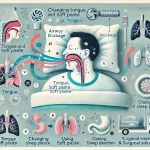Sleep Apnea Treatments
Sleep Apnea and Treatment Methods: What You Need to Know About Sleep Apnea Surgery
Sleep apnea is a serious condition that involves breathing pauses and snoring during sleep. If left untreated, it can lead to long-term health complications. In this article, we will provide detailed information about sleep apnea, its symptoms, and various treatment options. We will also explore sleep apnea surgery and how Dr. Sema Koç, an expert based in Antalya, offers effective solutions for this condition.
What is Sleep Apnea?
Sleep apnea occurs when airflow is obstructed, or when there are disruptions in the brain signals that control breathing during sleep. It can severely affect a person’s quality of life. Sleep apnea typically manifests in three types:
1. Types of Sleep Apnea
- Obstructive Sleep Apnea (OSA): The most common type, caused by the blockage of the upper airway.
- Central Sleep Apnea: Occurs when the brain fails to send proper signals to the muscles that control breathing, without a physical obstruction.
- Complex Sleep Apnea: A combination of obstructive and central sleep apnea.
Symptoms of Sleep Apnea
Sleep apnea affects not only nighttime sleep but can also have lasting effects throughout the day. The most common symptoms include:
- Loud snoring: A frequent symptom, especially with obstructive sleep apnea.
- Breathing pauses: Periods of stopped breathing during sleep, often followed by gasping for air.
- Daytime fatigue: Poor-quality sleep leads to constant tiredness and drowsiness throughout the day.
- Morning headaches: Lack of oxygen during the night can cause headaches upon waking.
- Difficulty focusing: Sleep deprivation can result in attention problems and memory issues.
Causes and Risk Factors for Sleep Apnea
1. Structural Factors
Certain physical traits, such as enlarged tonsils, tongue, or soft palate, can obstruct the airway, leading to sleep apnea.
2. Excess Weight
Obesity is one of the most common causes of sleep apnea. Fat deposits around the neck can obstruct the airway and make breathing difficult during sleep.
3. Age and Gender
Sleep apnea is more common in middle-aged and older men, but women are also at increased risk, especially after menopause.
4. Genetic Predisposition
If there is a family history of sleep apnea, individuals may be at higher risk of developing the condition.
Treatment Options for Sleep Apnea
1. Lifestyle Changes
The first step in treating sleep apnea often involves lifestyle changes. Losing weight, reducing alcohol and tobacco consumption, and adjusting your sleep position can greatly help. Sleeping on your side, for example, helps keep the airway open.
2. PAP Devices
Positive Airway Pressure (PAP) devices, including CPAP and BPAP, are widely used to treat sleep apnea. These devices deliver a steady flow of air through a mask to keep the airway open during sleep, effectively reducing snoring and apnea.
3. Sleep Apnea Surgery
For individuals with snoring and sleep apnea caused by structural blockages, surgical intervention may be necessary. Sleep apnea surgery is an effective method to reduce or eliminate apnea by widening the airway or removing obstructive tissues.
Surgical Treatment Methods for Sleep Apnea
Surgical treatment for sleep apnea requires skill and experience. Dr. Sema Koç in Antalya uses advanced technology and state-of-the-art equipment to perform various surgical procedures to address airway obstructions.
Pharyngoplasty and Palatoplasty
Pharyngoplasty and palatoplasty are commonly performed surgeries for sleep apnea. These procedures involve reshaping the soft palate and surrounding tissues to widen the airway.
Tongue Base Reduction Surgery
With robotic surgery or coblator devices, excess tissue from the tongue base can be removed, preventing the tongue from blocking the airway during sleep.
Additional Surgeries
- Tonsillectomy (removal of enlarged tonsils)
- Adenoidectomy (removal of adenoids)
- Septoplasty (correcting nasal septum deviations)
- Mandibular Advancement (realigning the jawbone to widen the airway)
Uvulopalatopharyngoplasty (UPPP)
UPPP involves the removal or reshaping of soft tissues in the throat. It is typically used to treat obstructive sleep apnea.
Maxillomandibular Advancement (MMA)
MMA surgery advances the upper and lower jawbones forward to enlarge the airway and reduce or eliminate sleep apnea and snoring.
Recovery Process After Sleep Apnea Surgery
The recovery time following sleep apnea surgery depends on the type of procedure performed. Generally, patients can return to normal activities within a few days, although full recovery may take a few weeks. Dr. Sema Koç closely monitors her patients’ post-surgery recovery to ensure a smooth and successful healing process.
Success Rates of Sleep Apnea Surgery
Sleep apnea surgery has a high success rate, particularly when the procedure is tailored to the specific needs of the patient. Dr. Sema Koç has successfully treated countless patients, improving their sleep quality and effectively reducing sleep apnea symptoms.
Why Choose Dr. Sema Koç?
1. Experience and Expertise
With over 22 years of experience, Dr. Sema Koç has performed thousands of successful sleep apnea surgeries. She is recognized as one of Turkey’s leading experts in sleep apnea and snoring surgeries.
2. Personalized Treatment Plans
Dr. Koç provides customized treatment plans based on each patient’s unique needs. By carefully assessing her patients’ conditions, she ensures that they receive the most appropriate and effective treatments.
3. High Success Rate
Dr. Koç’s sleep apnea surgeries are known for their high success rates, with many patients experiencing significant improvements in their sleep quality. Patient satisfaction is a testament to her expertise.
Conclusion
Sleep apnea is a condition that can significantly affect your quality of life and lead to serious health issues if left untreated. Sleep apnea surgery is one of the most effective ways to treat this disorder. If you are struggling with sleep apnea, Dr. Sema Koç offers personalized treatment solutions at her clinic in Antalya, providing the highest standard of care.
Frequently Asked Questions (FAQs)
- What is sleep apnea?
- Sleep apnea is a sleep disorder characterized by pauses in breathing and snoring during sleep.
- Is sleep apnea surgery effective?
- Yes, sleep apnea surgery is highly effective, particularly for patients with severe cases where it helps open the airway.
- How long is the recovery process for sleep apnea treatment?
- Recovery time varies depending on the type of surgery but typically ranges from a few days to several weeks.
- Why should I choose Dr. Sema Koç?
- Dr. Sema Koç offers personalized treatment plans with a high success rate and has over 22 years of experience in treating sleep apnea and snoring.
Choosing an experienced and reliable surgeon for rhinoplasty increases the success and safety of the surgery. Learning about your surgeon’s past successes, patient reviews, and portfolio can help you make the right choice. Additionally, maintaining open communication with your surgeon during the pre- and post-surgery processes to clarify your expectations and possible outcomes is important. In this respect, Associate Professor Dr. Sema Koç, with her 22 years of experience, successfully performs her surgeries. You can access her previous surgeries on her Instagram and website.
For more information about nose aesthetics and to schedule a consultation with Assoc. Prof. Dr. Sema Koç, you can contact our clinic.
Other Languages
Author





